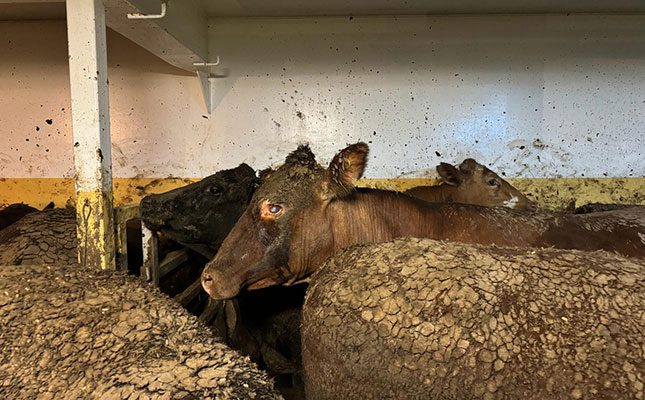
Photo: The National Council of SPCA
According to the NSPCA, the stench that came from the ship and raised concerns from members of the public was indicative of the awful conditions the animals, which had been on the sea for two-and-a half weeks up until then, had to endure due to a build-up of faeces and ammonia.
The NSPCA discovered diseased, injured and dead cattle among the 19 000 cattle aboard, and had to euthanise eight cows because of their poor condition. Treatment was given to the other animals to prevent further mortalities.
READ Animal health: putting together a first-aid kit for livestock
The NSPCA stated that the incident served as a stark reminder that the live export of animals by sea was a gruesome and outdated practice and underscored the urgent need for legislative reform and heightened global awareness to end this cruelty.
The Red Meat Producers Organisation of South Africa (RPO) clarified in a statement that the ship belonged to the international company Al Mawashi and that the current situation had nothing to do with the South African industry or Al Mawashi South Africa, which arranges and coordinates South African exports.
The NSPCA since 2019 had been in and out of court fighting for a live sheep export ban from South Africa, but it lost its case against Al Mawashi South Africa in 2021, with the exports allowed to continue subject to certain conditions.
Dr Frikkie Maré, CEO of the RPO, told Farmer’s Weekly that the RPO was concerned about the welfare of the animals on the ship, and recognised the rights of animals as noted in the Constitution of South Africa: “As primary producers, our animals are our pride. It grieves us to see animals receive poor treatment.”
Maré said that the industry was concerned about the possible influence the situation might have on the biosecurity of South Africa, with people moving on and off the ship and the possibility of dead animals being offloaded, especially because the Western Cape does not really have the capacity to handle livestock.
“As a country that is already struggling to regain its animal health status from the World Organisation for Animal Health, we cannot afford more breaches of our biosecurity.”
With the renewed call for a complete ban of live animal exports via sea, Maré pointed out that South Africa needed this alternative market to grow the industry, which in turn would contribute to rural development, poverty alleviation and job creation.
READ How technology is making monitoring animal health easier
“We export both live animals and carcasses. We cannot move away from live animal exports as this is what the import markets desire, usually for religious reasons.”
He pointed out that government in collaboration with the industry had drawn up a protocol for live exports, with more than 300 inputs by industry taken up in the protocol to ensure that exports were done responsibly. Work is currently underway to turn the protocol into legislation.
Since the only livestock export harbour in South Africa is in East London, the Eastern Cape RPO has established a livestock export forum, which together with the SPCA and other institutions, ensures that exports from South Africa take place according to this protocol.
READ Get to know your livestock’s nutritional requirements
He added that live exports from South Africa by ship had a good record, with mortalities on board being lower than mortalities in domestic feedlots.
Dr Ivan Meyer, the Western Cape Minister of Agriculture, in response to the incident made submissions to the ad hoc Committee on the Powers Bill in the Western Cape Provincial Parliament for the inclusion of veterinary services in the bill.
He explained that the Western Cape Powers Bill called for the Western Cape Government to gain greater control over the management of the port and trade.
If approved, the Western Cape Powers Bill will allow the Western Cape Government to intervene in similar situations and safeguard animal and public health, defend animal welfare and advance biosecurity.
In the interim, he said, the department would continue to support the relevant authorities in addressing concerns related to veterinary care, public health, and biosecurity.








